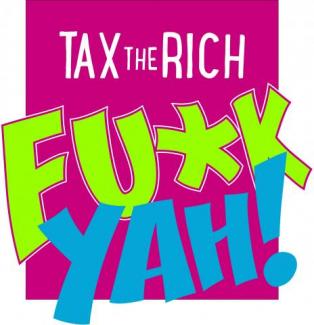THE BOTTOM LINE
Tax talk without the heavy lifting

PAYING INCOME TAX CAN EASILY PISS US OFF. Not so much because of what we have to pay—but because of what the rich DON’T have to pay. The special treatment they get would piss off Mary Poppins. It is obvious and unfair. It’s long past time to make ‘em pay their fair share.
Politicians and Bay Street lawyers like to make that seem undesirable and all but impossible. It isn’t. There are plenty of simple, direct and immediate steps we could take to make sure the rich pay their fair share. Five of the best are:
-
a tax on wealth
-
an inheritance tax
-
an increase in the capital gains tax
-
an elimination of tax havens
-
a tax on excess covid profits.
Wealth tax
Rich people own a lot of stuff. More and more all the time. They don’t pay any tax on any of that wealth They should.
Research from the Canadian Centre for Policy Alternatives shows that the 87 richest families in the country each hold, on average, 4,448 times more wealth than the typical family. Together these 87 families hold more wealth than the bottom 12 million Canadians combined.
Inequality on this scale is not good for us. It creates envy and resentment and can only be achieved by taking away more from the many at the bottom to give more to the very, very few at the very top.
A tax on all the wealth—on all the mansions, cars, land, yachts, jewelery—that the rich and ultra rich accumulate would be one way to begin to reduce that inequality.
A wealth tax on the super rich is hugely popular: 75% of respondents in a recent poll—including 69% of Conservative voters—favoured a tax of 1-2% on large fortunes of $20 million or more.
Updated research shows a 1% tax on wealth over $20 million in Canada would generate about $10 billion in revenue in its first year.
With a $10 billion boost to annual public revenues, Canada could lift hundreds of thousands of people out of poverty, implement long-term increases to funding for important social programs like child care, health care and seniors care, and help pay for more ambitious climate action
Inheritance tax
Tobias Lutke’s kids are sitting pretty. Not only did their father found Shopify to become one of the richest billionaires in Canada (est. $8.4 billion)—but when he dies they get to keep it all. Tax free.
They wouldn’t be so lucky if they lived in the USA, the United Kingdom, Japan, France, Germany, or Italy. Every other rich country in the G7 would tax his heirs up to 50 per cent on what they inherited. But not here. Canada is the only G7 country that doesn’t have an estate tax.
It's long past time we did.
The capital gains tax
Everyone knows the rich are getting richer. What is not as well known is that since 1990 the tax burden on Canada’s richest households had been steadily falling.
How can that happen in a country with a progressive income tax system, where what you pay in income tax is supposed to rise as your income rises? The answer is, the wealthy don’t earn their money from wages alone. They make a lot of it in “capital gains”—the money they get from investments like stocks and bonds and real estate.
They use their money to make money, but that’s not wage income, so they don’t pay income tax on all of it. Our tax law only requires them to pay tax on half of it. In other words, they get a 50% tax break.
But if you are a middle-class Canadian struggling to pay the mortgage and put away a little for the kids’ education, every cent of wage income that you earn is taxed.
Tax havens
Rich Canadians are good at tax dodging. A favourite dodge is to bank their income offshore in “tax havens” (countries that share limited or no financial information with foreign tax authorities).
This costs us all big time.
Canadian corporate cash stashed away in tax havens tops $380 billion. That’s more than our entire federal deficit.
The tax we don’t collect on all that hidden income amounts to billions—the Parliamentary Budget Office estimates it could be as high as $25 billion a year.
An extra $25 billion a year in collected tax would give us money to pay for more programs of direct benefit to everyday Canadians that we are always told are beyond what we can afford.
Excess profits tax
The pandemic has been very good for big business. Of 111 large Canadian corporations analyzed in a recent study, one-third were enjoying record profits during the pandemic.
During the world wars, Canada and other nations had excess profits taxes of up to 80% for profits above what were considered “normal profits”. It’s time to bring these back.
A key purpose of an excess profits tax is to ensure that “a few do not gain from the sacrifices of the many.”
- 30 -













Add new comment